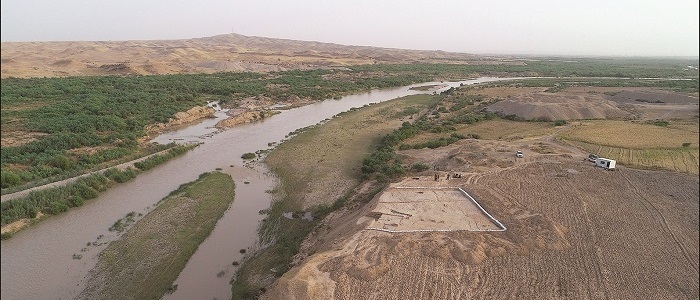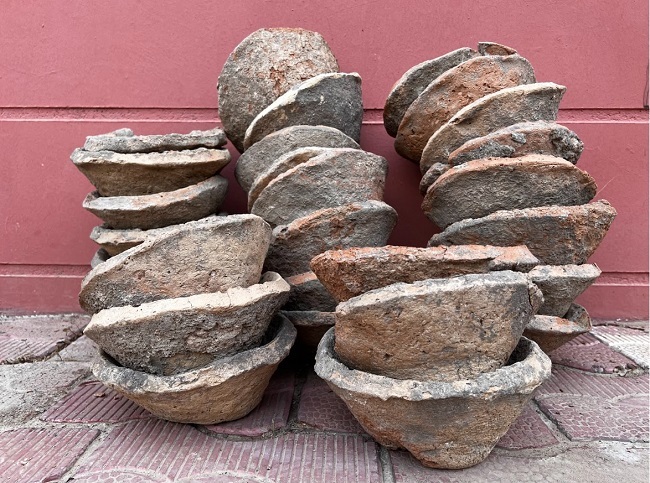New evidence for the emergence and the rejection of the earliest state institutions uncovered in Iraq
Published: 4 December 2024
Excavations at an ancient Iraqi site called Shakhi Kora have revealed new clues about the origins of the world's earliest governing institutions, according to research led by the University of Glasgow.

Excavations at an ancient Iraqi site called Shakhi Kora have revealed new clues about the origins of the world's earliest governing institutions, according to research led by the University of Glasgow.
The research published in the journal Antiquity today (Wednesday 4 December 2024) suggests these early governing institutions emerged partly from their ability to provide large-scale meals, potentially as payment for labour. However, the later abandonment of these centralised structures, without signs of violent overthrow or environmental stress, points to a deliberate rejection of centralised forms of organisation that likely involved increasing top-down control.
The international team led by the University of Glasgow’s Professor Claudia Glatz has been carrying out excavations at Shakhi Kora since 2019 as part of the Sirwan Regional Project and in collaboration with the Garmian Directorate of Antiquities, Kurdistan Region of Iraq.
Shakhi Kora is a Late Chalcolithic site in the Kurdistan Region of Iraq, whose inhabitants were increasingly connected to the Uruk world of southern Iraq in the 4th millennium BCE (Before Common Era).
Archaeologist Professor Glatz said: “Our excavations at Shakhi Kora provide a unique, new regional window into the development, and ultimately the rejection, of some of the earliest experiments with centralised, and perhaps state-like, organisation.”
The excavations at Shakhi Kora uncovered a long sequence of structures spanning several centuries. Over time, the cultural items found at the site shifted from reflecting primarily local traditions to being closely associated with the major ancient city of Uruk in southern Iraq, one of the world's first cities, which featured a large-scale monumental precinct in the later 4th millennium BCE and yielded thousands of clay tablets containing the earliest written texts.

Researchers found large quantities of simple, roughly made bowls in the institutional structures at Shakhi Kora, similar to Uruk and other contemporary sites in the wider region. This suggests that they were used to provide large-scale communal meals, potentially for workers who were dependent on or connected to the institutional households there.
Further analysis of the animal bones, including stable isotope results, as well as results of organic residue analyses of the lipids trapped inside the walls of ceramic vessels, indicate that these meals would have frequently consisted of hearty meat stews. As such, the findings indicate the origins of the state and its institutions in Mesopotamia lie in part at least in their ability to provide food to members of a wider community. A series of deposits suggesting ritual activities may point to another important function.
Salah Mohammed Sameen, the director of the Garmian Department of Antiquities and Heritage said: “Shakhi Kora and the results of ongoing excavations there are providing critical new data that allows us to better understand this important period in Iraqi Kurdistan.”
However, the eventual abandonment of the final institutional building at Shakhi Kora, without any signs of it being violently destroyed or seemingly facing environmental pressures, the research paper says, points to a deliberate choice by the local community to move away from this centralised system of authority and resource distribution. This challenges the idea that the development of powerful, hierarchical governments was an inevitable outcome or took place unopposed in early complex societies.
Professor Glatz said: “This reaffirms that top-down, hierarchical forms of government were not inevitable in the development of early complex societies. Local communities found ways to resist and reject tendencies towards centralised power.”
The research team plans to continue investigating the origins, development, and demise of these early state institutions, as well as exploring how they acquired the resources needed to provision large-scale communal meals, and how their relationships with surrounding communities was structured and developed over time.
The archaeology team who carried out the excavations at Shakhi Kora are made up of academics from:
- Archaeology, School of Humanities, University of Glasgow, UK
- Vorderasiatische Archäologie, Freie Universität Berlin, Germany
- School of History, Classics and Archaeology, University of Edinburgh, UK
- Environmental Archaeology and Material Science, National Museum of Denmark, Copenhagen, Denmark
- Centro de Estudos em Arqueologia, Artes e Ciências do Património, Universidade de Coimbra, Portugal
- Archaeological Research Unit, Department of History and Archaeology, University of Cyprus, Nicosia, Cyprus
- Garmian Department of Antiquities, Kalar, Kurdistan Region, Iraq
The Sirwan Regional Project
The Sirwan Regional Project explores the archaeological landscapes in and around the river known in Kurdish as the Sirwan and in Arabic as the Diyala in the Kurdish Region of Iraq. Learn more here.
About Antiquity
Antiquity is an international peer-reviewed journal of world archaeology, published six times a year and edited by Dr Robert Witcher (outgoing editor) and Professor Robin Skeates (incoming editor). The journal was founded by O.G.S. Crawford in 1927 and is currently edited in the Department of Archaeology at Durham University (head: Professor Tom Moore). The journal is published in partnership with Cambridge University Press (CUP).
Antiquity website: http://www.antiquity.ac.uk
First published: 4 December 2024
<< Latest news

